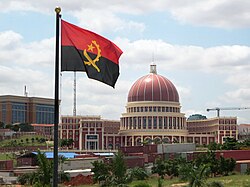
In a little-known chapter of post-World War II history, Angola narrowly escaped a geopolitical transformation that could have altered the continent’s future forever.
In 1945, as the world emerged from the ashes of global war, the United States, Great Britain, and France lobbied Portuguese dictator António de Oliveira Salazar to cede parts of Angola for the creation of a Jewish homeland.
The proposed territory included Benguela and parts of Cuanza Sul and Huambo. But Salazar stood firm.
“Angola is an integral part of Portugal, and as such, Portugal would never cede an inch of its land to others,” he reportedly stated, rejecting the diplomatic pressure outright.
This proposal, though ultimately declined, placed Angola at the heart of global post-war power struggles.
Analysts now believe the Western powers were attempting to reposition Portugal’s historic “Pink Map” ambition — a colonial vision to link Angola and Mozambique through modern-day Zambia, Zimbabwe, and Malawi — as a tool for influence and expansion in Sub-Saharan Africa.
The concept clashed with Britain’s own colonial railway ambitions, aimed at stretching from Cairo to Cape Town.
By 1890, that imperial tension reached its climax when London issued an ultimatum demanding Portuguese withdrawal from disputed territories — or face war.
Lisbon acquiesced, abandoning its “Pink Map” dream under immense pressure.
Fast forward to 1903, and the construction of the Benguela Railway — now part of the modern Lobito Corridor — began under the auspices of British interests.
While once a tool of imperial logistics, the corridor today is reborn as a critical artery in global trade, contested not just by Western powers, but now by China and Russia as well.
Despite its historical importance, many Angolans remain unaware of how close their nation came to becoming a satellite Jewish state — and what that might have meant.
“If Salazar had ceded Benguela, what would have happened to the black Africans living there?” Kandanda asks.
Drawing parallels to Gaza and other conflict zones, he paints a grim hypothetical picture of oppression and dislocation.
“This is not about anti-Semitism,” he clarifies.
“I lived in Germany.
I visited the memorial to the Israeli athletes attacked in 1972 every weekend with my daughters.
But I cannot understand how those who survived genocide now turn that trauma into state policy.”
Kandanda’s reflection is ultimately a call to consciousness: for Africans to awaken from what he describes as “naivety” and understand their continent’s true geopolitical weight. Africa, he warns, remains a coveted zone of global rivalry — not a land of equal partnerships, but one caught in the grip of industrialized nations scrambling for control over minerals, territory, and influence.
“Quo vadis, Africa?” he concludes — Where are you going? The answer, he argues, lies not in alliance with power, but in remembering history, asserting sovereignty, and building a future defined by African agency, not foreign ambition.



